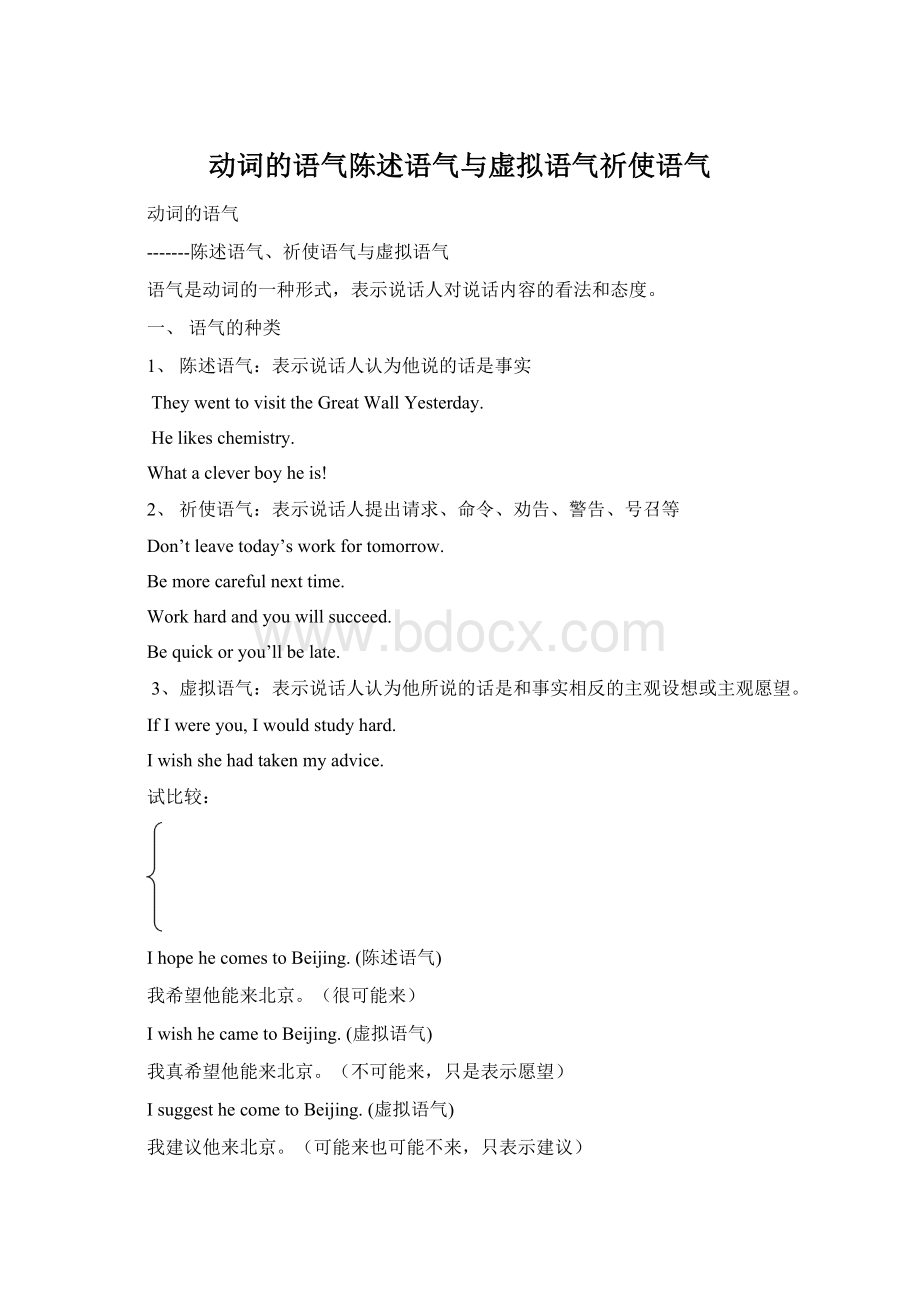动词的语气陈述语气与虚拟语气祈使语气文档格式.docx
《动词的语气陈述语气与虚拟语气祈使语气文档格式.docx》由会员分享,可在线阅读,更多相关《动词的语气陈述语气与虚拟语气祈使语气文档格式.docx(14页珍藏版)》请在冰豆网上搜索。

我希望他能来北京。
(很可能来)
IwishhecametoBeijing.(虚拟语气)
我真希望他能来北京。
(不可能来,只是表示愿望)
IsuggesthecometoBeijing.(虚拟语气)
我建议他来北京。
(可能来也可能不来,只表示建议)
IfIamapresident,Iwillmakeallthepeoplerich.(陈述语气,可能是候选人说)
IfIwereapresident,Iwouldmakeallthepeoplerich.(虚拟语气,可能是小学生说)
IfIwintherace,Iwillbuyacar.(陈述语气,得过第一名的人说)
IfIwontherace,Iwouldbuyacar.(虚拟语气,最后一名说)
在陈述语气中,主、从句时间一般要取得一致;
而在虚拟语气中,主、从句时间经常不一致,不互相制约,因为表示愿望、假设等。
如:
Ifitrainstomorrow,Iwillnotgoout.(时间一致,都表示将来)
如果明天下雨,我就不出门了。
Ifithadrainedlastnight,thegroundwouldbewetnow.(时间不一致,主句表示现在,从句表示过去)
如果昨晚下雨的话,现在地上就会是湿的。
二、虚拟语气在条件句中的用法
1、虚拟语气在if条件句中的使用。
(表示根本不存在的情况或实现可能性很小的假设)
1)表示与现在事实相反的情况
if条件句谓语动词形式
主句谓语动词形式
动词过去式(be用were)
would/should/could/might+动词原形
Iftheweatherwerefine,theywouldgoforaswim.(would用于各种人称)
如果天气好,他们就去游泳了。
(事实天气不好)
Ifwehadtimenow,weshould/wouldreaditagain.(should主要用于第一人称)
要是现在我们有空,我们就把它再看一遍。
(事实我们现在没空)
IfIwererich,Iwouldbuythatcar.
IfIhadacar,Ishouldbeveryhappy.
Ifyoutookhisadvice,youmightbewellsoon.(might表示“或许”、“可能”之意)
2)表示与过去事实相反的情况
had+过去分词
would/should/could/might+have+过去分词
IfIhadtakenhisadvice,Iwouldnothavemadesuchamistake.
如果我听了他的忠告,就不会犯这样的错误了。
(事实上当初我没有听他的忠告)
Hewouldn’thavebeenabletowritesuchagoodnovelifhehadn’tlivedamongtheworkersforsomanyyears.假如他不是和工人一起生活这么多年,他不可能写出这样好的小说。
(事实上当时他和工人生活在一起了)
IfIhadknownhertelephonenumber,Icouldhavecalledher.(could表示“能够”)
Ifyouhadtoldhimthatthingyesterday,hemighthavemadesomesuggestions.
IfIhadhadenoughmoney,Ishouldhaveboughtthatcar.
Ifhehadhurried,hecouldhavecaughtthetrain.
3)表示与将来事实相反的情况
1、动词过去式(be用were)
2、should+动词原形
3、wereto+动词原形
Ifsheshouldcome,Iwouldaskherforhelp.
(“should+动词原形”表示对将来的极大怀疑,意思是“万一”,表示可能性极小。
)
万一她来的话,我就请她帮忙。
(事实上她来的可能性很小)
Ifyoushoulddroptheglass,itwouldbreak.杯子摔下来会打碎的。
(事实上杯子没有摔下来)
IfIweretogotoabroad,IwouldgotoAmerica.
Ifitshouldraintomorrow,Imightgetlost.
[注意]如果说话人认为if条件句所表示的是事实(客观存在的情况或实现性很大的假设),全句就可以用陈述句语气。
Ifyoudoitoncemore,youwilldoitbetter.
如果你再做一遍,你就会做得更好。
(事实上完全可以再做一遍)
4)混合虚拟语气
有时从句和主句分别表示发生在不同时间的动作或状态,这时,动词的形式根据它所表示的时间加以调整。
Ifhehadfollowedthedoctor’sadvice,hewouldbequiteallrightnow.
他当时若是听从医生的话,现在就会痊愈了。
(从句说明过去,主句说明现在)
IfyouweretomasterEnglish,youshouldhaveworkedhard.
如果你要掌握英语,你本来应该下苦功的。
(从句说明将来,主句说明过去)
Youcouldanswermostofthequestionsnowifyouhadreviewedthelessonlastnight.
如果你昨晚复习功课,现在你就能回答大部分问题。
Ifhehaddiedintheaccident,hecouldn’tstandinfrontofyounow.
如果他在那次事故中死去,他现在就不会站在你面前了。
5)在if虚拟条件句句中,如果从句中含有should,had或were,可以省去if,把should,had或were移到主语之前。
Shouldithappen(=Ifitshouldhappen),whatwouldyoudo?
如果真发生这样的事,你怎么办呢?
WereIyou(=IfIwereyou),Iwouldgo.如果我是你,我就去。
Hadherecognizedme(=Ifhehadrecognizedme),hewouldhavecomeover.
如果他认出了我,早就走过来了。
WereItogohome(=IfIweretogohome),Iwoulddoalotofhomework.
Hadhehurried(=Ifhehadhurried),hecouldn’thavebeenlateforschool.
Shouldhefail(=Ifheshouldfail),hewouldleaveschool.
IwouldhavecalledyouhadIknownyourtelephonenumber(=IfIhadknownyourtelephonenumber).
6)Ifitwerenotfor+短语…..和Ifithadnotbeenfor+短语…..也是一种条件虚拟
语气从句,意思是“如果不是……”。
IfitwerenotfortheguidanceofthePartyCommittee,weshouldfail.
如果不是党委的指导,我们会失败的。
(现在情况)
Ifithadnotbeenforthehelpofourteacher,weshouldnothavemadesomuch
progress.如果不是老师的帮助,我们就不会取得这么大的进步。
(已发生的情况)
2、ifonly…..与onlyif…….
1)ifonly作“只要”讲,引出真实条件句,谓语动词用陈述语气。
Ifonlyyouworkhard,you’lllearnEnglishwell.
Ifonlyitclearup,we’llgoforapicnic.
2)ifonly作“如果……就好了”“要是……就好了”讲,引出虚拟条件句,用来表示强烈的愿望或遗憾,谓语动词用虚拟语气。
通常省略主句。
Ifonlyshehadknownwheretofindyou!
IfonlyIcouldspeakseveralforeignlanguages!
IfonlyIwereyou!
IfonlyIwereabird!
Ifonlyyouhadknownaboutit!
Ifonlythealarmclockhadrung!
IfonlyIhadn’tlostit!
要是没丢掉它就好了!
[注意]谓语动词用一般过去时表示现在没有实现的愿望。
谓语动词用过去完成时表示过去没有实现的愿望。
3)onlyif表示“只有在……情况下才能……”,“只有在……条件下才能……”。
谓语动词用陈述语气。
Iwakeuponlyifthealarmclockrings.只有闹钟响了,我才会醒。
Itoldhimhewouldsucceedonlyifhetriedhard.
[注意]onlyif从句如果放在主句前,则主句用倒装语序。
OnlyifmyteacherhelpsmecanIsucceed.
三、虚拟语气在宾语从句中的用法
1、在动词一个坚持宁愿怂恿打算安排(insist,prefer,urge,intend,arrange);
两个命令(order,command);
四个建议(suggest,advise,propose,recommend);
五个要求(ask,require,request,demand,desire)等动词的宾语从句,谓语动词要用“(should)+动词原形”。
Sheinsistedthatwe(should)helpher.
Heurgedthatwe(should)leave.
Tomorderedthatallthepeople(should)gotothefront.
Wesuggestthatthemeeting(should)beputoff.
Thechairmanproposedthatwe(should)notdiscussthequestion.
Iaskedthathe(should)cometomyoffice.
Theworkersdemandedthattheirwages(should)beraised.
Irequiredthattheworkbedonetomorrow.
[注意]
suggest作“表明、暗示”“认为”讲时,从句不用虚拟语气。
Mr.Smith’soralEnglishsuggeststhatheisfromCanada.
Tomcamehomequickly,whichsuggestedthatshehaspassedthefinalexam.
AreyousuggestingthatIamtoooldforthejob.(认为)
Isuggestthatheislying.
insist作“坚持认为、坚持说”讲时,后面跟一种事实或客观情况,从句不用虚拟语气。
Heinsistedthathehadseenthefilm.(坚持认为)
Theyoungmaninsistedthathehaddonenothingwrongandbesetfree.
表示此类动词相关内容的从句(如主语从句、表语从句和同位语从句),也使用“(should)+动词原形”。
Itwassuggestedthatwe(should)putthematchoff.
Hissuggestionwasthatwe(should)putthematchoff.
ItisrequestedthatMr.Li(should)giveaperformanceattheparty.
2、动词wish后的宾语从句必须用虚拟语气,表示不可能实现的愿望。
其结构如下:
主语+过去式(表示与现在事实相反)
主语+wish+(that)+主语+过去完成式或couldhavedone(表示与过去事实相反)
主语+could/would/might+动词原形(表示将来不太可能实现的愿望)
IwishIwereasstrongasyou.
IwishIhadnevermethimbefore.
IwishIcouldhelphim.
IwishedthatIhadknownthatearlier.
IwishnowthatIhadknownthatyesterday
IwishIcouldhavegonetothemovieswithyoulastnight.
Iwishyouwouldgowithustomorrow.
3、wouldrather/hadrather/wouldsooner(宁愿)+从句时,从句须用虚拟语气。
表示现在和将来,用一般过去时I’dratheryoucametomorrow.
表示过去,用过去完成时。
I’dratherIhadn’tdonethat.
4、在“Iamsurprised/sorry+that从句”和“Iregret+that从句”时,从句谓语动词要用should,其中should不可省略,意思是“竟然”,表示说话人的惊异、懊悔、失望等情感。
须用虚拟语气。
Iamsurprisedthatheshouldhavebeensorudetoyou.
四、虚拟语气在主语从句中的用法
1、在“Itis+adj./n.+that从句”中,that从句常常用“(should)+动词原形”。
这些形容词或名词有:
strange,surprising,amazing,astonishing,wrong,important,necessary,essential,natural,natural,possible,probable,ridiculous,desirable,advisable,preferable,urgent,insistent,better,funny,pitiful,eager(热切的),anxious(急切的),unthinkable(不可想象的),apity,ashame,athousandpities,nowonder,noright等。
Itisnecessarythatsomeimmediateeffort(should)bemade.必须立即采取行动。
Itisnecessarywe(should)readEnglishshouldeverymorning.
Itisimportantthattheprogram(should)beloadedintocomputer.把程序输入计算机非常重要
[注意]在“Itisstrange(surprising,amazing,astonishing,wrong,apity,ashame,athousandpities)that从句”等结构后的that从句谓语动词要用should,其中should不可省略,意思是“竟然”,表示说话人的惊异、懊悔、失望等情感。
Itisquitewrongthatthechildrenshouldbegivensomuchhomeworktodo.
ItisapitythatHenryshouldbesocareless.
Itisashamethatheshouldhavedonesuchathing.
2、在Itis+过去分词+that从句”中,that从句须用“(should)+动词原形”。
这些过去分词有:
一个坚持宁愿怂恿打算安排(insist,prefer,urge,intend,arrange);
五个要求(ask,require,request,demand,desire)等动词的过去分词。
Itisdesiredthatwe(should)arrivetherebeforedark.
Itwasproposedthatthematter(should)bediscussedatthenextmeeting.
ItwasarrangedthatthepartyshouldbeconductedinEnglish.
五、虚拟语气在表语从句中和同位语从句中的用法
1、在insistence,order,command,advice,suggestion,proposal,recommendation,demand,desire,requirement,request,motion,plan,idea,decision等词后的表语从句和同位语从句中,谓语动词用“(should)+动词原形”。
Thedemandisthatwe(should)workhard.(表语从句)
Theorderisthatthetroops(should)withdrawatonce.(表语从句)
Therequirementisthatwe(should)keeptherules.(表语从句)
HegavemeasuggestionthatI(should)leaveChengduforshanghaiatonce.(同位语从句)
Theprofessorgaveordersthatthetestbefinishedbefore5:
30.(同位语从句)
Hemadetherequestthattheproblemshouldbesettledatonce(同位语从句)
2、asif/asthough引导的表语从句或方式状语从句所表达的内容如果与事实情况相反或发生的可能性不大,则从句中需使用虚拟语气。
如从句表示与现在事实相反,谓语动词用一般过去时
如从句表示与过去事实相反,谓语动词用过去完成时
如从句表示将来发生的可能性不大,谓语动词用would/might/could+动词原形
Shelooksasthoughsheweresick.(表语从句)
Itlooksasifitmightrain.(表语从句)
Helooksasifhehadjustmetaghost.(表语从句)
Itseemsasifitwerewinteralready.(表语从句)
Hetalksasifheknewallaboutit.(方式状语从句)
Sheactsasthoughshewereanexpert.(方式状语从句)
Heremainedcalmasifnothinghadhappened.(方式状语从句)
Hetalksaboutpyramidsasthoughhehadseenthemhimself.(方式状语从句)
Shelooksafterhimasifhewereherownchild.(方式状语从句)
但asif/asthough后面的从句有时也可以用陈述语气,表示从句中的情况往往是可能发生的。
Itlooksasifitisgoingtorain.
Itlooksasifoursideisgoingtowin.
Hewalksasifheisdrunk.(=Heisprobablydrunk)(真实情况)
Hewalksasif